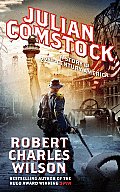
| Publisher: | Tor |
| Copyright: | June 2009 |
| Printing: | June 2010 |
| ISBN: | 0-7653-5923-5 |
| Format: | Mass market |
| Pages: | 689 |
The best description I have for the setting of Julian Comstock: A Story of 22nd Century America is post-apocalyptic 19th century boy's adventure. The cover's echoes of the Civil War, Planet of the Apes, and Fallout are all apt and somehow merge together into a cohesive whole: a world set after the collapse of modern civilization, runaway global warming, and peak oil. Technology has regressed to a 19th century world of farming, horses, and a city aristocracy. This future world is highly religious, and not the good kind of religion. The Dominion Church has taken over the United States, which in turn has taken over the North American continent, apart from a long-standing war with Europe (primarily Germany) fought mostly in Newfoundland and Labrador.
Enter Adam Hazzard, a country boy and loyal Christian, albeit one raised in a denomination mostly favored by indentured laborers and featuring snake charming. He is our narrator, starting the story in an indistinguished small town notable only because his boyhood friend, Julian Comstock, lives on a country estate there. Julian is the nephew of the President, Declan the Conqueror, which makes him a high-class Aristo and far out of Adam's social class. However, he's also the son of Declan's brother, an immensely popular general whom Declan had executed on trumped-up charges out of fear of his growing popularity. This makes Julian's standing uneasy at best, but provides the opportunity for quiet teenage years in a small village.
Adam and Julian are teenage boys at the start at the novel, fond of exploring the find from local Tips (combination dig sites and dumps of abandoned artifacts of earlier ages) and, at Julian's prompting, long and frequently sacrilegious discussions of philosophy. They're watched over by Sam, a loyal former companion of Julian's father. We get bits and pieces of the world background, as well as plenty of hints that Julian is going to become someone great, in Adam's early chapters. This book is written in an effective mimicry of a rambling 19th century novel with a great deal of personal commentary by the author and occasional comments addressed to his believed audience (others of his own time). It also makes quite effective use of footnotes, which strike an entertaining balance between mock scholarship and ironic commentary.
In short, it reminds one of a post-apocalyptic Victorian novel as written by Mark Twain.
And it's very well-written. Robert Charles Wilson is a well-respected veteran SF author and quite good at stringing words together. He does an excellent job maintaining the tone, down to an occasionally unreliable narrator with blind spots. But if Wilson has a typical flaw, it's that he can build a rich and complex background, put complex characters in it, and then write a book about nothing much happening. That's my main complaint. The book is not devoid of plot, starting with a military draft that has the boys and their guardian fleeing their home and into a war, but it never quite satisfied me. I spent the whole book waiting for the sudden shift of gears into more dramatic heroism, or a grand reveal that would drop the bottom out of the world, or some other sudden perspective shift. It never happened. Despite Julian's meteoric rise through US politics (heavily foreshadowed from the opening page), Julian Comstock never seems to kick itself into that higher gear.
But putting aside my persistent feeling that the book drifted through its nearly 700 pages without hitting the high points that I was hoping for, what Julian Comstock does succeed in being is a detailed portrait of a slightly abstracted, philosophical man who through determination and quite a bit of luck takes on an established, fanatical church. It's a story of science versus religion that's likely to appeal to the core audience of SF, but it's also a beautiful emulation of appreciative biography. I got the most enjoyment out of the book not from the plot but from the delicate metafictional game that Wilson plays. The reader is aware that this is an entirely fictional novel, but one can't help get absorbed in the faux biography mixed with Adam's experiences with pulp publishing industries and a nod to first-hand descriptions of trench warfare, which builds a second layer of realism between the story and the reader. The biographical challenges of accuracy, embelishment, entertainment, audience, and interpretation play out on the page, often in surprising bits of sly humor.
It's an odd connection for a story of post-apocalyptic politics, but I suspect Julian Comstock will appeal the most to lovers of alternate history. It also is catching a bit of the steampunk wave due to its overall technology level, although in this case there is little or no "punk" apart from Julian's obsession with an emulation of early motion pictures. It's not hard SF fare; if you're looking for the mind-blowing ideas of Spin, you may be disappointed, and likewise if you were hoping for dramatic rising action. But as a careful and detailed bit of world-building and character exploration with a built-in metafictional game, it offers unexpected pleasures. Recommended cautiously.
Reviewed: 2010-08-28